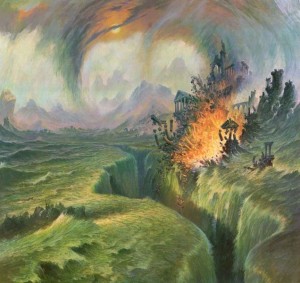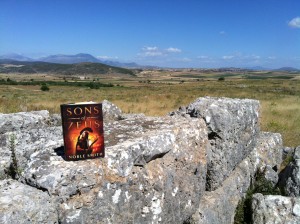[Image credit: The Fall of Númenor by Darrell K. Sweet]
I had to take a hiatus from writing my Shire Wisdom blog for about five months. I had a weird and scary thing happen to my heart (and I’ll write about that in a blog post soon). But I’m all better now, thanks to my family and the fact that I followed what I had learned while writing The Wisdom of the Shire! (Author, heal thyself!)
I was also deep into writing the second book in my Warrior Trilogy. The first book hit the stores on June 11th, and I just got back from Greece where I was finishing up research for Book 3 and meeting with my Greek publisher. You can read about my amazing trip to the very real place where my story takes place here. (I took the photo below this May at the ruins of the citadel of Plataea in Boeotia, Greece.)
A lot of people have asked me why someone like me–a lover of Tolkien and fantasy–would write a historical fiction series. What does it have to do with Tolkien? Well, reading Tolkien as a boy piqued my interest in ancient Greek mythology. I had a teacher, a priest in fact, who told me that the fall of Númenor from The Silmarillion was based on the legend of Atlantis. It intrigued me to think that Tolkien had learned a story (probably when he was very young) that grew inside him like a magic tree and evolved into something uniquely his own.
Delving into Homer for the first time (which I did so after reading my own version of the Iliad, aka The Lord of the Rings) I was struck by the similarity in the “high style” of some of Tolkien’s writing, especially the battle scenes. In fact, if you read The Letters of J.R.R. Tolkien there is this wonderful quote in Letter 142: “I was brought up in the Classics, and first discovered the sensation of literary pleasure in Homer.” –J.R.R. Tolkien, 1953
In The Wisdom of the Shire I wrote about the Greek legend of the Ring of Gyges and how this story–a ring of invisibility that brings with it a terrible curse–most likely influenced the invention of Sauron’s One Ring.
Tolkien even coined an important literary word using Greek roots: Eucatastrophe. It means “good catastrophe”–a turn of events for the protagonist where everything suddenly goes from utter crap and doom to rainbows and awesomeness (think the finale of The Return of the King and the fall of Barad-dûr).
When I was in college I started reading the ancient Greek playwrights, and then the histories of Thucydides and Herodotus. The real world of ancient Greece, especially the so-called “Golden Age” of 5th century BC Athens, started to pull me in. For years I read everything about the Greeks that I could get my hands on, scouring used bookstores for obscure tomes and scholarly treatises.
About ten years ago I was hired to write a treatment for a documentary set during the Peloponnesian War (the bloody 30-year-long battle between Sparta and Athens). While rereading Thucydides I came across a story that I had glossed over the first time I had seen it. It was the tale of an independent and democratic city-state called Plataea that was invaded in a sneak attack at the outset of the Peloponnesian War. The heroic and clever way that the Plataeans fought off the invaders, and the subsequent epic siege of their citadel (which became the longest siege in the history of the world) struck me as a story that needed to be told. And so I started working on my novel Sons of Zeus.
Ten years later that book is sitting on the shelves in bookstores and libraries around the country. And I am incredibly proud of this story of love, courage and sacrifice. I never would have written this series if I hadn’t read J.R.R. Tolkien’s works. So that’s how a fantasy author influenced me to write a work of historical fiction. And I could rewrite Tolkien’s quote about the Classics like this: “I was brought up in Middle-earth, and first discovered the sensation of literary pleasure in Tolkien.”
Sons of Zeus is available at public libraries in the US and Canada, at Amazon.com, Barnes&Noble, indie booksellers, as well as ebooks and unabridged audiobook.


